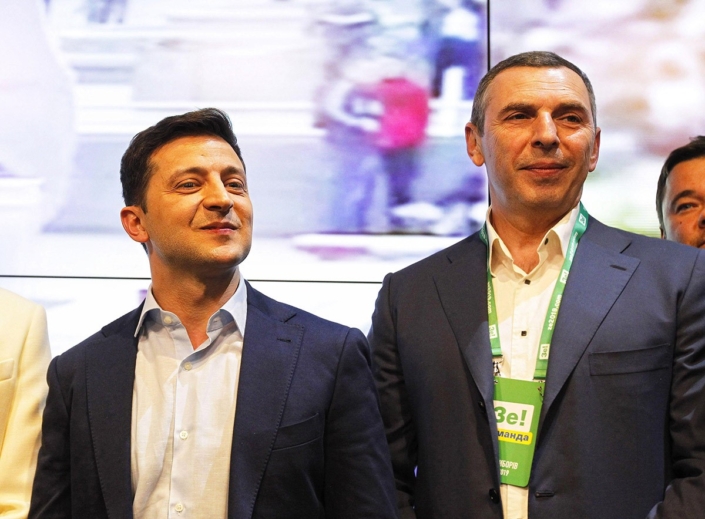Biden declares 'Kyiv stands' in surprise visit to Ukraine
________
Source: Occidental Observer
Jewish Corruption in Ukraine
February 17, 2023 | by Andrew Joyce, Ph.D. | 61 Comments
"At the same time, fifty Jewish families own 80% of all wealth. Where do you see the Ukrainian oligarch? I don’t know any. They are all Jews. Their wealth betrays their own bragging rights: Rolls-Royces, planes, castles, hotels, casinos owned in Monte Carlo. Aircraft and yachts under foreign flags. And, of course, they don't pay taxes. And plants and factories were bought by them not at a real price, but stolen from the entire Ukrainian people." - Serhiy Ratushniak, Former Mayor of UzhhorodWith Russia now slowly escalating its 'special military operation' against Ukraine on the eve of its first anniversary, I find myself drawn once again to the complex but stark phenomenon of extreme Jewish corruption in the latter nation. While it's become commonplace to note Volodymyr Zelensky’s Jewishness, and perhaps also that of Volodymyr Groysman, the first Prime Minister to serve under Zelensky, I have yet to read a detailed discussion of the major Jewish players in the ongoing saga of Ukrainian oligarchy and its political affiliates. If anything, the present conflict is a huge distraction from the fact that, for decades, the biggest threat to Ukraine hasn't been Russia, but financiers and speculators operating with impunity within Ukraine's borders to exploit ethnic Ukrainians and plunder their resources.
Speaking in general terms, of course, Ukraine is an extremely corrupt country, with the culture of fraud and graft stemming in large part from the Soviet legacy and saturating all levels of society. Crooks of all ethnic backgrounds are ubiquitous in the nation. Bribery is systematic, where it’s accepted as a basic fact of life by ordinary citizens and extends even to such mundane tasks as vehicle inspection. As well as infesting politics, bribery and other forms of corruption remain endemic in the police force, higher education, health care, and the justice system, with the result that Ukraine ranks alongside some of the worst African nations in Transparency International’s assessment of corruption perception. According to 2015 data, politically connected businesses accounting for less than 1 per cent of companies in Ukraine owned more than 25 per cent of all assets and accessed over 20 per cent of debt financing. In the capital-intensive mining, energy and transport sectors, politically connected businesses accounted for over 40 per cent of turnover and 50 per cent of assets.
Far from being the beacon of freedom presented to us now by the mass media, Ukraine is a nation bankrupt in social trust and well-accustomed to the yoke of exploitation. There has been little internal outcry over the massive trafficking of its women for sex, both inside and outside the country, with coastal cities such as Odessa becoming sex tourism hubs for the worst of the Turkish and Israeli middle classes. Ukraine now has the highest adult HIV prevalence outside Africa, with sexual contact outpacing injection drug use as the primary form of transmission since 2008. The National Institute on Drug Abuse points out that substance abuse in Ukraine has been at epidemic proportions for the last 15 years.
Ukraine is on multiple levels a deeply flawed and troubled state, and like any bloody carcass it has attracted its share of hyenas. I believe, however, that Jewish corruption in Ukraine, despite Jews only comprising around 0.5% of the Ukrainian population, is of a character significant enough to merit special attention. In the following essay I want to explore some of the key players and their interconnections, as well as to offer some thoughts on the reasons why anti-Jewish attitudes have not taken hold in Ukraine, and why they are unlikely to do so in the future.
How 'Anti-Corruption' Is Zelensky?
Now overshadowed by his reinvention as a kind of Second Coming of Winston Churchill, Zelensky's first great transformation was that of a close associate of the worst of Ukraine's oligarchs (Ihor Kolomoisky, discussed below) into an "anti-corruption" populist. Zelensky's relationship with Kolomoisky goes back to around 2012, when Zelensky and the Jewish brothers Serhiy and Boris Shefir, began making content for Kolomoisky's TV stations through their production production company, Kvartal 95. As is now well-known, Zelensky's political ascent began after his starring role in the political satire 'Servant of the People,' which began airing on Kolomoisky's 1+1 network in 2015. The 1+1 channel had been founded by another Jew, Alexander Rodnyansky. Servant of the People starred Zelensky as a school teacher whose anti-corruption rant in class is filmed by a student, goes viral, and wins him the presidency. Zelensky turned to real-world politics, capitalized on widespread public anger at corruption, and ended up winning the Presidency with ease just three-and-a-half years after the show's launch.
Zelensky is entirely a media creation, a blank canvas upon which anything can be projected. Before the war, the German Council on Foreign Relations pointed out that "Zelensky has so far been very vague about his policies and vision for the future. So it has been extremely difficult to tell what he stands for or fact-check his largely policy-free statements in the way the experts have for other candidates. He rarely mentions facts."
Zelensky’s 2019 campaign was dogged by doubts over his authenticity given his close association with Kolomoisky. Britain’s Royal Institute of International Affairs astutely observed that, even if Zelensky was earnest in his claims to oppose the corrupt, "he cannot govern without systema [the oligarchic structure] and will bow to its interests." In the heat of the campaign, an ally of incumbent Petro Poroshenko (rumored to have a Jewish father), journalist Volodymyr Ariev (who also claims Jewish ancestry), published a chart on Facebook purporting to show that Zelensky and his television production partners were beneficiaries of a web of offshore firms, which they had set up beginning in 2012, that received $41M in funds from Kolomoisky's Privatbank. Many of these allegations were proven correct after the leaking of the Pandora Papers, millions of files from 14 offshore service providers, to the International Consortium of Investigative Journalists.
The documents show that Zelensky and his Jewish partners in Kvartal 95 set up a network of offshore firms dating back to at least 2012, the same year the company began making regular content for Ihor Kolomoisky. The offshores, which filtered Kolomoisky's money through the British Virgin Islands (BVI), Belize, and Cyprus in order to avoid paying tax in Ukraine, were also used by Zelensky associates to purchase and own three prime properties in the center of London. The documents also show that just before he was elected, Zelensky gifted his stake in a key offshore company, the British Virgin Islands-registered Maltex Multicapital Corp., to Serhiy Shefir — soon to be his top presidential aide. And in spite of "giving up his shares," the documents show that an arrangement was soon made that would allow the offshore to keep paying dividends to a company that now belongs to Zelensky's wife.
Zelensky and Serhiy Shefir
Besides providing financial support during Ukraine’s 2019 election, Kolomoisky supplied Zelensky with cars, and the bulletproof Mercedes Zelensky used on the campaign trail was owned by Kolomoisky associate Timur Mindich — who is on the board of trustees of the Jewish Community of Dnipropetrovsk, a body of which Kolomoisky was president. Although Zelensky continued to deny that his relationship to Kolomoisky was anything but professional, the Kyiv Post reported in April 2019 that Zelensky traveled a total of 11 times to Geneva and an additional two times to Tel-Aviv, during precise periods when Kolomoisky was in these locations. Zelensky's travel companions during these trips included Jewish oligarch and close Kolomoisky associate Gennadiy (Zvi Hirsch) Bogolyubov, and the brothers Hryhoriy and Ihor Surkis both whom have been accused of serious corruption. They are among the wealthiest people in Ukraine and are Jewish through their mother Rima Gorinshtein. The very Jewish character of these trips should come as no surprise given that, where possible, Zelensky likes to surround himself with Jewish aides. In the aftermath of the outbreak of war, for example, it emerged that he sought advice on public relations from two Likud-backing Israelis, Srulik Einhorn and Jonatan Urich.
Zelensky hasn't exactly turned on the hand that fed him, and his rise coincided with the downfall of several of Kolomoisky's opponents. After Zelensky became President, Kolomoisky's nemesis at Ukraine’s central bank, Valeria Gontareva, was subjected to a sustained campaign of intimidation. Criminal proceedings were brought against her for alleged abuse of office during her time at the central bank, her Kiev flat was raided by the police, a car belonging to her daughter-in-law, also called Valeria Gontareva, was torched, and her house outside the Ukrainian capital was set ablaze and destroyed. Under Zelensky, Ukraine's parliament passed a measure that prevented Kolomoisky from having to pay higher taxes on his mining operations, and prior to the start of the war with Russia all indications pointed to the renewed influence of interest groups opposed to reform. First, in March 2020, was the dismissal of the government of prime minister Oleksiy Honcharuk (who didn't help his case by attending a concert headlined by an anti-Jewish heavy metal band), followed, a day later, by the removal from office of the reformist prosecutor-general, Ruslan Ryaboshapka. Then, in April, came the Constitutional Court's blocking of judicial reforms, and a ruling by the same court, in October, that effectively paralyzed the work of the National Agency for Corruption Prevention. In July 2020 Zelensky forced the resignation of Yakov Smolii as National Bank of Ukraine (NBU) governor. After leaving his position, Smolii referred to "systematic political pressure" on the bank, and did not rule out a coincidence of interest between the President's Office and Kolomoisky. He said that the President's Office wanted to replace the NBU's leadership with people it could control. Smolii's resignation came shortly after Ukraine had received the first tranche of a new $5 billion IMF stand-by arrangement. A key condition for continued IMF support was the independence of the NBU, and the IMF had made it clear that it held Smolii and his team in high regard.
Please go to Occidental Observer to continue reading.


No comments:
Post a Comment
Note: Only a member of this blog may post a comment.